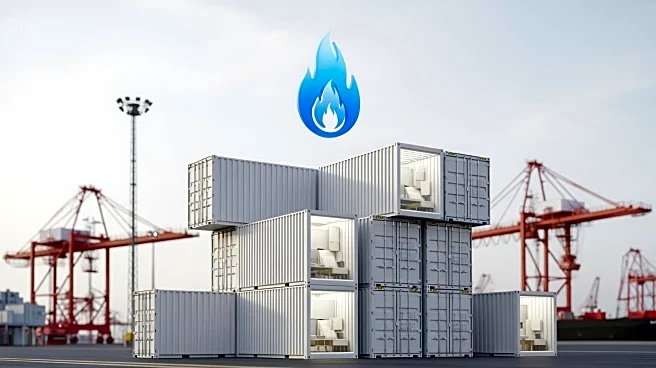What's Happening?
The Propane Education & Research Council (PERC) is emphasizing the benefits of propane as a key energy source for reducing emissions at ports and terminals. In a recent discussion on the MarineLink Podcast, Jim Bunsey, Senior Manager of Business Development
at PERC, highlighted the successful implementation of propane-powered port tractors at the West Basin Container Terminal (WBCT) in the Port of Los Angeles. This terminal, operated by Ports America, has been utilizing propane for over two decades, resulting in significant reductions in fuel costs, emissions, and maintenance expenses. The initiative is part of a broader effort to transition to cleaner energy sources within the maritime industry, which is under increasing pressure from environmental organizations to reduce its carbon footprint.
Why It's Important?
The adoption of propane as an alternative energy source at ports is significant for several reasons. Firstly, it demonstrates a viable pathway for the maritime industry to reduce its environmental impact, aligning with global efforts to combat climate change. By lowering emissions, ports can contribute to improved air quality in surrounding communities, which is crucial for public health. Economically, the use of propane can lead to cost savings in fuel and maintenance, providing a competitive advantage for operators like Ports America. This shift also supports the U.S. economy by promoting energy independence and the use of domestically produced fuels. Stakeholders in the maritime and energy sectors stand to benefit from these developments, as they align with regulatory trends favoring sustainable practices.
What's Next?
As the maritime industry continues to explore sustainable energy solutions, the success of propane at the Port of Los Angeles could serve as a model for other ports across the U.S. and globally. Future steps may include expanding the use of propane-powered equipment and infrastructure at additional terminals. Stakeholders, including port authorities, environmental groups, and government agencies, are likely to monitor these developments closely. The ongoing dialogue between industry leaders and policymakers will be crucial in shaping regulations and incentives that support the transition to cleaner energy sources. Additionally, technological advancements in propane applications could further enhance its appeal as a sustainable energy option.
Beyond the Headlines
The shift towards propane and other alternative fuels at ports reflects broader trends in the energy sector, where there is a growing emphasis on sustainability and innovation. This transition is not only about meeting regulatory requirements but also about positioning the maritime industry as a leader in environmental stewardship. The cultural shift towards greener practices may influence public perception and consumer behavior, potentially driving demand for more sustainable shipping options. Furthermore, the success of propane initiatives could spur investment in research and development, leading to new technologies and applications that further reduce the environmental impact of maritime operations.















